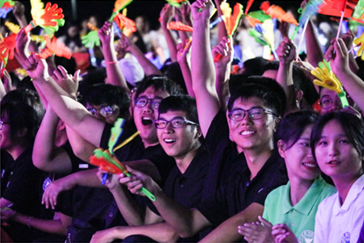School of Media and Law
The School of Media and Law was established in May 2020. |
|
With nearly 1,400 full-time undergraduate students and 57 faculty members, the School has four undergraduate majors: Journalism, Advertising, Internet and New Media, and Law.
The School is equipped with three research institutes—Institute for Journalism and Communication Studies, Institute for Internet and New Media, and Institute for Law and Intellectual Property. It also has three research centers—Huallywood Film Research Center, China-Australia Social Computing and Data Management Research Center, Center for Scientific and Technological Innovation and Intellectual Property.
At present, among the 36 full-time teachers, 83.3% are holders of PhD degrees, 50% are at levels of associate professor or above, and two thirds have experiences of studying overseas. The School has one Professor of “9211 Project” (a cooperation agreement between Ningbo Municipal Government and Zhejiang University), two doctoral supervisors and 11 master’s supervisors. Faculty members have been awarded various grants and titles at municipal and provincial levels.
The School has built a comprehensive platform for professional practice in order to improve students’ professional skills. (1) The practice platform of “News on the Move”, established back in 2007, has seen 18 portfolios published and greatly benefited more than 1,500 students majoring in journalism, advertising, network and new media, etc. As a well-known brand, the platform has won a lot of honors at provincial and municipal levels; (2) “Round Table” serial brands have been created to construct the extracurricular development system. Four platforms of Round Table classes, Round Table masterclasses, Round Table law society and Round Table charitable organization have helped to further optimize the learning environment, enhance students’ innovation capabilities, and significantly improve the passing rate of the national judicial examination; (3) The educational mechanism of “Coordination among Four Entities” has been implemented, with NingboTech, Ningbo Municipal Court System, Ningbo Municipal Procuratorate System and Guanghua Law School of Zhejiang University working together to promote the integration of practice, training and internship; (4) Collaboration has been enhanced between the University and enterprises for student cultivation and a long-term guarantee mechanism has been set up for the integration of industry and education. The School has developed numerous quality bases for professional practice such as China Education Daily, Ningbo Daily, people’s courts in Ningbo, etc. The yearly employment rate is over 95% with a considerable number of students starting up their own business or furthering their studies abroad.
The School, with one high-level research & teaching team, is promoting the integration of two disciplines, deepening the reform of three research institutes, and setting up four distinctive academic groups. Centering on new industries, new business forms and models with regional characteristics, the two first-level disciplines of journalism and communication as well as law are actively docking the structural upgrading of local industries and the development of emerging industries of strategic importance so as to serve the local socio-economic needs. At present, seven academic platforms have been created: (1) Communication Studies: key provincial discipline; (2) Journalism: key municipal discipline; (3) Journalism and Communication: key municipal discipline (B category), university-level first-class discipline; (4) Kaku Animation and Cultural Innovation Team: municipal cultural innovation team; (5) Ningbo Key Research Base for Cultural Industry, Ningbo Research Center for Cultural Industry, and Ningbo Research Center for Scientific and Technological Innovation and Intellectual Property Rights: key municipal research bases; (6) Ningbo Institute of Women’s Research: local service platform; (7) International Huallywood Society: international society.
In the past five years, the School has received a total scientific research fund of around 23.81 million yuan ($3.4 million). Five national projects and 11 projects at the provincial or ministerial levels have been approved. Staff members have won one second prize of Achievement Award granted by Zhejiang Federation of Humanities and Social Sciences Circles, one ministerial-level achievement award, three municipal or department-level achievement awards. 29 monographs have been published by well-known presses, and 52 papers have been published in top national and international journals including three in authoritative journals, two in SCI, three in SSCI, seven in A & HCI and four in CPCI-SSH. The School has also entered partnership with the Publicity Department of CPC provincial committee, Chinese Academy of Social Sciences and Ningbo Municipal Government. Five international academic conferences of film researches have been held since the establishment of Huallywood Film Research Center back in 2016 and nine high-end international and national academic conferences have been successfully hosted, which witnessed an attendance of nearly 1,000 people.
The School has taken the initiative to strengthen exchanges with governmental, academic and business circles, and to further enhance internationalization and openness. At present, it has reached an intent of cooperation with colleges and universities from the United States, Britain, Poland, South Korea and Japan, and employed four scholars from British and American universities as experts in the School Key Discipline Construction Committee. In the past five years, over 200 students have been sent for overseas exchanges. Many graduates have been admitted to top 100 universities in the world, such as the University of Sydney, the University of Edinburgh and King’s College London.
The School has a complete set of teaching facilities, including the big data lab, the radio and television lab, the video and communication lab, the simulation lab for newspaper editing and publishing, the advertising and graphic design lab, the moot court and training center for law teaching.
CONTACT DETAILS
School of Media and Law
Ms. YU Yiwen
International Affairs Secretary
Email: yiwenyu@nbt.edu.cn






